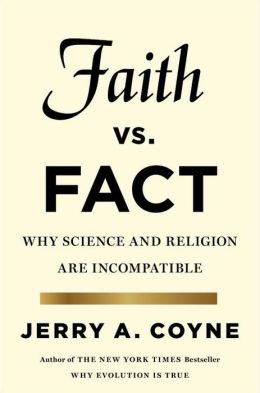Jerry Coyne is on the road promoting his new book, Faith versus Fact, and getting a lot of predictable blowback.
Several people seemed to conflate religious faith with other kinds of faith. One person asserted confidently that when he reads a science book, he has the same kind of faith in the scientist that he does when listening to a preacher or reading scripture. Ergo, he said science is based on faith. I told him that I discuss exactly this question in the book, and that the “faith” we have in popular science writers like Brian Greene, Richard Dawkins, Lisa Randall, Brian Cox, and so on is not the same as believers have in clerics: those scientists have attained renown because their work has been continually vetted by other scientists. It seems to be a common misconception that faith in what a scientist or doctor says is exactly the same kind of faith that believers have in their priest. The difference, of course, is that there is no way for the pronunciations of a cleric to be checked and verified reliably by other clerics. (Or, if they were, they’re likely to be repudiated: imagine an imam pronouncing on the validity of what the Pope says!). I wrote an article in Slate on this very issue (part of which appears in my book), and I hope people can think harder about the different meanings of the word “faith.”
Perhaps one of the most common criticisms of science by believers, then, is that, like religion, it is based on faith. I interpret this to mean, “You are as bad as we are.”
Scientists and engineers very rarely use the word ‘faith’ for the specific reason that it is so often misapprehended. The word ‘faith,’ as used by preachers when they tire of your objections and say “You just have to have faith,” means “You have to believe without evidence” or “You just have to believe what logic denies,” or “Shut up and take my word for it.” In that sense, ‘faith’ is all but unknown to most scientists and engineers; we are empiricists who rely on established facts. On those rare occasions when a scientist or engineer uses the word ‘faith,’ its meaning is akin to ‘educated confidence.’
David Steinman had faith in his design of the Mackinac Bridge because, following the Tacoma Narrows bridge disaster, he set aside his career and spent 7-years studying and inventing the field of suspension bridge aerodynamics; he had done the wind tunnel experiments, he had solved the mathematics, he had educated confidence in his design. If he had faith in his design in the sense in which a preacher uses that word — that is, if he ‘just knew’ the design was good even though it made no sense whatever — he would have been reckless, he almost certainly would have killed a lot of people, and he would have deserved to have his engineering license pulled.
As a consulting civil engineer, I worked chiefly (though not exclusively) with other technical professionals; I was rarely obliged to explain these elementary, but important, distinctions. I imagine that for lawyers and doctors, however, the frustrations of client ignorance and illogic must be endless.
Only the preachers, who traffic in gaseous ephemera like souls, can thrive on that. Those responsible for the well being, the real lives, of real people, can’t afford it.

